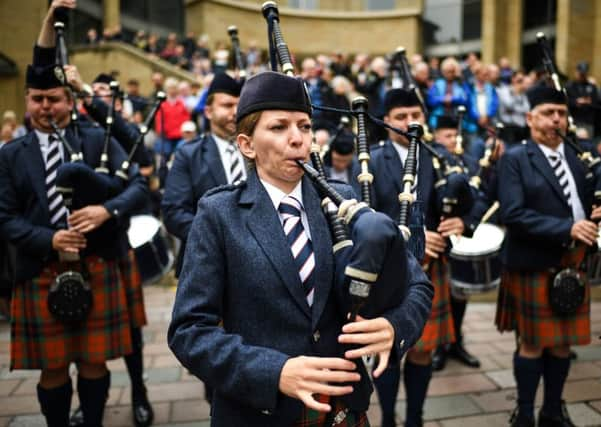Music review: Piping Live!


Various venues, Glasgow ****
Hence a show titled Standard Habbie, at the National Piping Centre, hub of Glasgow’s week-long Piping Live! festival, saw the Lowland and Border Pipers’ Society delve intriguingly into the poem and its world, enlisting singers Alasdair Roberts, Iona Fyfe and Neil Sutcliffe, piper Fin Moore, fiddler Roo Geddes and saxophonist Konrad Wiszniewski, conducted by piper-narrator and singer Donald G Lindsay.
Among the little-known tunes mentioned in the poem, Trixie became a harmonious, part-singing round, while for the contentious Day It Daws, Lindsay gave a striking rendition of Landlady Count the Lawin (aka Hey Tutti Tatti or Scots Wha Hae) before admitting that recent research suggested The Gentle Day Daw, which promptly floated melodiously from Wiszniewski’s soprano sax. Moore’s playing, on small pipes, of the gently paced and venerable-sounding Hunt’s Up opened and closed the show, with the ensemble singing it to a conclusion that was oddly moving.
Advertisement
Hide AdThe day kicked off with the Simon Fraser University Pipe Band from British Columbia, six times World Championship winners, forming a semi-circle round the inscrutable statue of Donald Dewar, their marches and strathspeys, jigs and reels echoing off the urban canyon of Buchanan Street.
In the Piping Centre’s popular tented Street Café, performers included the Royal Army of Oman, impressively garbed in red tunics and tartan plaids, their conventional pipe band line-up augmented by three hand-drummers and a piper toting a squalling goatskin bagpipe with which he whirled around a bemused audience.
Two underground stops away, at the College of Piping (now merged with the Piping Centre but somewhat bureaucratically labelled “TNPC Otago Street”), the distinctive strains of the Irish uilleann pipe sounded in a low-key but enjoyable presentation by Armagh Pipers’ Club, an institution that has produced many notable players.
Back at the Piping Centre, a sobering exhibition, Pipers of the Great War, marks the centenary of the end of the conflict by invoking the regimental pipers who conducted themselves heroically – and sometimes fatally – amid the carnage. It includes such fabled piper-composers as PM Willie Lawrie (who died after being invalided home) and PM John MacLennan, enshrining the paradox that out of the mud and blood emerged such enduring tunes as Battle of the Somme and Bloody Fields of Flanders.
Ironically, it was from Flanders that one of the day’s brightest acts came, as Madingma – brothers Stefan and Diederik Timmermans – performed on bagpipes and diatonic accordion. On this occasion Stefan played mouth-blown Border-style pipes, as opposed to the long-droned Flemish instrument associated with bucolic Brueghel canvases, but their perky Flemish jigs and polkas, French bourées and waltzes, reminded us joyfully of an ancient pan-European bagpipe lineage.
JIM GILCHRIST